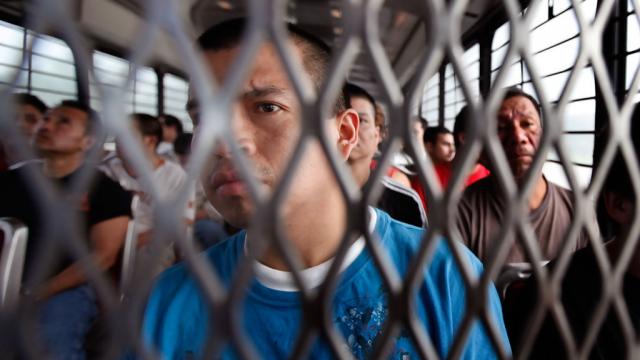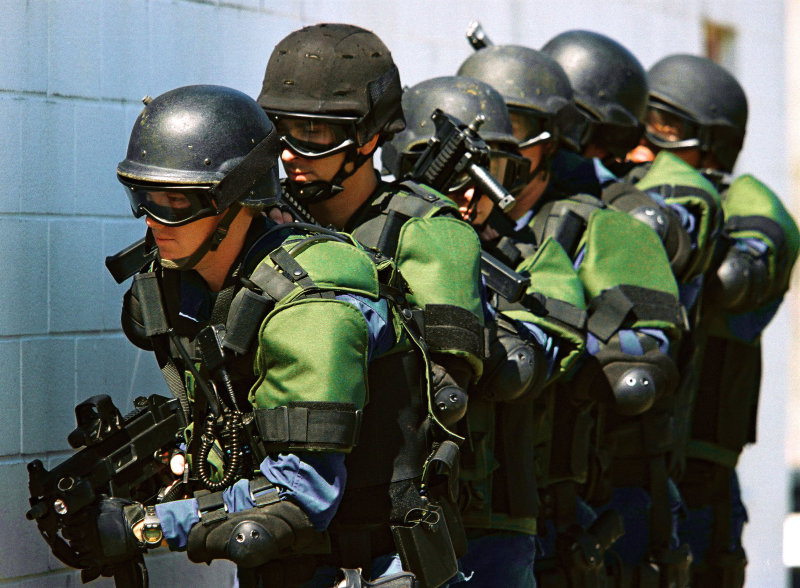
Immigration and Customs Enforcement, the Department of Homeland Security and the White House have been busy overhauling the policies and procedures set in place to determine which of the approximately 11 million undocumented immigrants living in the country get deported each year.
The policy, known as “prosecutorial discretion,” aims to shift ICE’s limited manpower and resources to “high-priority” undocumented immigrants like felons, violent criminals, repeat criminal offenders and national security threats. The goal? To boot as many delinquents from the country as possible with the limited funding at the agency’s disposal.
It’s an enforcement reform, in other words, designed to target the criminal elements within undocumented communities while enabling largely law-abiding individuals to recede from ICE’s enforcement radar and remain in the country. And it’s been a huge success.
At least, that’s the official line.
While ICE, DHS and the Obama administration tout the prosecutorial discretion program’s success in cracking down on criminal elements and ramping up deportations from the U.S., some observers have criticized ICE for missteps committed during the overhaul process, and for taking much longer than expected to make the transition from policy blueprint on paper to real enforcement protocol on the ground and in the immigration courts.
Most damaging, however, is ICE’s refusal to release detailed end-of-year removal data that may—or may not—substantiate the claimed success of the policy.
Prosecutorial Discretion?
Key to the prosecutorial discretion program has been establishing scaled “priority levels” associated with the severity of undocumented immigrants’ criminal offenses.
Such a system allows ICE to prioritize the deportations of individuals convicted of serious crimes, such as drug trafficking or manslaughter, over those arrested for low-level offenses like driving without a license or disorderly conduct.
ICE has outlined three distinct enforcement priority areas covering everyone from undocumented criminal offenders with the most serious criminal records to low-level offenders, immigration fugitives (undocumented individuals already ordered by immigration judges to leave the country), recent border crossers and noncriminal immigrants.
At the apex of ICE’s enforcement focus, ICE leadership has reiterated, are those undocumented individuals who comprise threats to security or are guilty of committing serious crimes like felonies.
“Aliens who pose a danger to national security or a risk to public safety are ICE’s highest enforcement priority,” wrote ICE Director John Morton in an agency-wide memo announcing the prosecutorial discretion policy reform in March 2011.
This is not to say that one must be a gang member or be suspected of espionage to be booted out of the country. Undocumented immigrants arrested for lesser crimes, such as driving under the influence, also register as part of the agency’s radar as Priority 1 removal targets. What separates these lesser offenders from more serious delinquents, however, are distinct “offense levels” built within the prosecutorial discretion policy’s Priority 1 bracket.
Put simply, prosecutorial discretion allows ICE personnel to filter out criminal offenders (Priority 1) from recent illegal entrants (Priority 2) and immigration fugitives (Priority 3) and then take a distinct enforcement action based on a criminal’s offense level.
“Smarter” Enforcement?
Never before has so much thought been put into determining what type of specific legal action to take against a given undocumented immigrant.
Prosecutorial discretion represents a significant departure from ICE’s previous official modus operandi, which consisted of little more than blanket deportation for many detained undocumented immigrants, regardless of the seriousness of the offense they may have committed.
And for many immigrant rights activists and immigration lawyers—not to mention the scores of undocumented immigrants currently living in the country—the policy reform has come as breath of fresh air.
It’s part of the Obama administration’s greater effort to distinguish its stance on deportation—and relations with the Latino community in general—from that of the Bush administration, which oversaw a dramatic rise in the removal of noncriminal undocumented immigrants guilty for nothing more than being in the country without a visa.
“It’s smart enforcement,” says Laura Lichter, an immigration attorney based in Denver.
“One of the things they [ICE] looked at was…what’s appropriate to have in court? Because essentially they have to throw the same amount of resources at trying to deport somebody who’s lived here for 20 years and doesn’t have a criminal history…as they would as, you know, getting rid of somebody who’s a gangbanger or murderer," she said.
“It doesn’t make any sense to spend your effort prosecuting the sort of moral equivalent of a bank robber and a jay walker to the same extent.”
Jason Flora, an immigration lawyer who represents undocumented immigrants arrested throughout Indiana at the Chicago Immigration Court, welcomes the “smarter” enforcement design of the prosecutorial discretion policy.
“I’d characterize…[this] as using more common sense,” Flora said. “In other words, someone that has been apprehended for driving a car without a license is not going to be the same priority as someone who has been here for five years dealing coke.
“It’s pretty clear to see that it’s way more useful to our society and a way more efficient use of our time and money and resources to concentrate on people who are really the bad apples."
How Criminal is “Criminal?”
End-of-year removal data published by ICE and the Department of Homeland Security provide for a quick litmus test of prosecutorial discretion’s success in cracking down on criminal elements within the undocumented community. And a look at the data reveals a staggering upward shift in criminal deportations since President Obama’s 2009 inauguration.
For instance, from 2008 to 2012, the number of “criminal” undocumented immigrants who have been deported has skyrocketed from 97,000 to 225,000—an increase of 132 percent in five years.
Meanwhile, the removals of aliens described as “noncriminal” have decreased from 262,000 to 184,000—a 30 percent drop. This made 2012 the first year in more than a decade in which “criminal” removals outnumbered “noncriminal” removals.
However, there is a problem here, and it’s one of semantics: What does ICE mean when it says “criminal?”
“A criminal alien is any alien with a criminal conviction,” said Flora.
In Indiana that includes everything from Class C misdemeanors, such as public intoxication and driving without a license, to aggravated felonies like murder, rape and sexual abuse of a minor.
“So if you’ve been convicted of a traffic misdemeanor, driving without a license, driving while suspended, or just walking down the street drunk…all those people would be counted as criminal aliens,” said Flora.
“That’s different from those people who I think of as criminals like drug dealers and rapists and murderers. I think something’s askew. I don’t think they belong in the same category.”
Indeed, critics of ICE’s enforcement policies say the agency’s interpretation of the title “criminal alien” is so broad that many low-level offenders are still being arrested, prosecuted and deported, despite the agency’s policy of priority-first prosecutorial discretion.
“While ICE states it is targeting serious criminals who pose a threat to public safety and security, what it actually counts in its statistics of deported convicted criminals is quite different,” states a report by analysts with the Transactional Records Access Clearinghouse (TRAC), a research group at Syracuse University that analyzes staffing, spending and enforcement activities of the federal government.
ICE itself has released few descriptive bits of information regarding the criminal backgrounds of individuals deported recently. Of the 225,390 individuals classified as “criminal” that were removed from the country in 2012, more than 83,300 were convicted of either homicides, sex offenses, DUIs or drug crimes.
But the agency provides no information on the offenses of the other 142,000 deportees, leaving it unclear whether they reflect the new high-priority enforcement objectives or are first time offenders guilty of low-level offenses, such as driving without a license or other misdemeanors.
ICE has rebuffed efforts seeking more data that may bring clarity to the issue.
The Syracuse University research group, for instance, has a long-pending Freedom of Information Act (FOIA) request dating to 2010 that seeks case-by-case data for all recorded convictions for deported aliens and priority and threat levels associated with each individual. But ICE has yet to release the information, TRAC analysts say.
“ICE is resisting releasing more detailed records sought by TRAC that might help the public understand what about these offenses justified the classification of the noncitizen as a Level 1 convicted criminal,” the group says.
Low-priority Individuals Still Targeted
What little information observers have managed to secure from ICE suggests that agency officers and prosecutors still readily target low-priority individuals.
Analysts with TRAC, for instance, have obtained data documenting the “threat level” and the “most serious” criminal conviction for every undocumented immigrant being held in ICE custody on one particular day in 2011.
Of the 32,300 undocumented immigrants in ICE detention throughout the country on Oct. 3, 2011, nearly 10,000 are designated “Priority 1, Threat level 1” individuals—in other words, the worst of the worst. However, the “most serious” criminal convictions associated with these 10,000 individuals vary significantly, from low-level Class C misdemeanors to aggravated felonies.
In fact, the convictions run a gamut of 282 different criminal offenses covering everything from homicide, gang activity, heroin smuggling and rape of the disabled to traffic offenses, disorderly conduct, trespassing, shoplifting and pickpocketing.
Such a wide scope of criminal offenses listed by ICE personnel as first-priority individuals fit for deportation suggests that at least some agents have not adhered to prosecutorial discretion’s guidelines.
Susan Long, professor at Syracuse University and co-director of TRAC, says this is not surprising.
“In any large agency, there will be at least a few individuals that aren't following top level directives for a variety of reasons,” she said. “The more important question is how dominant is this practice? The relative lack of detailed data and ICE's uncooperativeness in complying with FOIA makes it impossible to answer this question.”
3 WAYS TO SHOW YOUR SUPPORT
- Log in to post comments














